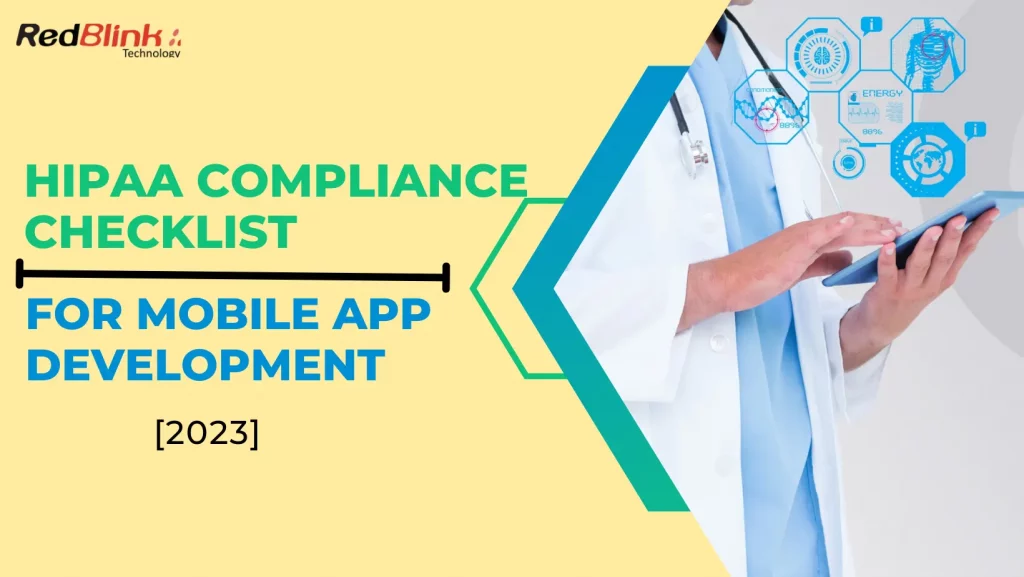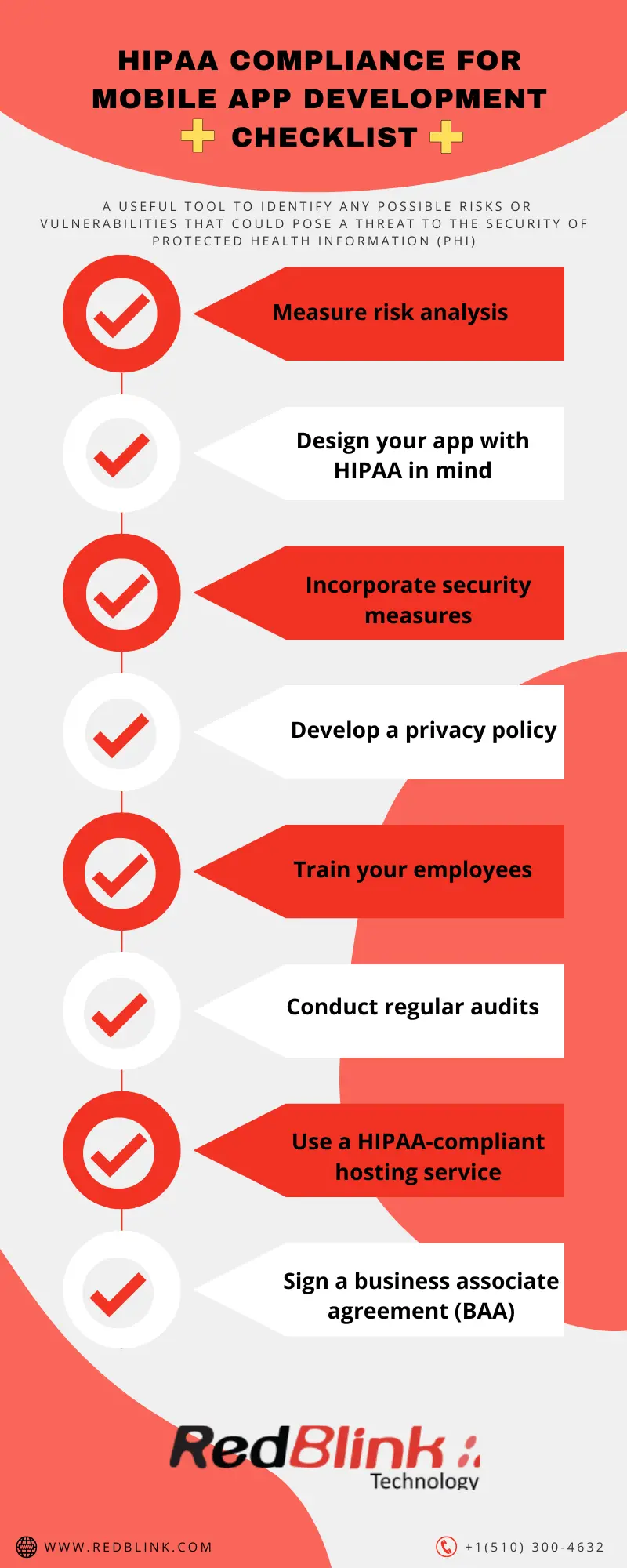HIPAA Compliance Checklist for Mobile App Development [2024]
“Mobile health apps are revolutionizing the healthcare industry,” says Karen DeSalvo, former National Coordinator for Health Information Technology at the U.S. Department of Health and Human Services.
However, with the increasing demand for healthcare apps, healthcare service providers must prioritize HIPAA-compliant mobile app development to protect patient data.

To ensure a better understanding of HIPAA compliance guidelines, it’s important for healthcare service providers to familiarize themselves with the requirements before diving into the world of mobile healthcare apps.
That’s where the HIPAA-Compliant Checklist for Mobile App Development 2024 comes in, outlining the essential steps needed to create apps that prioritize patient privacy and security.
So, let’s take a closer look at this checklist and see how healthcare service providers can develop HIPAA-compliant apps that meet the highest standards of privacy and security.
Contents
- HIPAA Compliance Checklist for Mobile App Development [2024]
- Importance of HIPAA Compliance in Mobile App Development
- Which Healthcare Apps Should Comply With HIPAA rules?
- mHealth and HIPAA Compliant Apps for consumers
- mHealth HIPAA Compliant Apps for Healthcare Service Providers
- Key Considerations for HIPAA-Compliant Mobile App Development
- HIPAA Compliant Mobile App Development Checklist
- RedBlink – One Stop Solution for developing a HIPAA-Compliant Mobile App Development!
Importance of HIPAA Compliance in Mobile App Development
Did you know that according to a survey conducted by the Pew Research Center, around 60% of Americans have used mobile health apps to monitor their health or access health-related information? This highlights the growing importance and popularity of mobile health apps in the healthcare industry.
Health Insurance Portability and Accountability Act(1996 – 2013 revised), is a set of regulations to guarantee the confidentiality and security of sensitive patient data across various healthcare applications
Most of the healthcare apps related to medical data are as per the compliance standards. Developing a compliant mobile app is easy. Healthcare software developers straight away follow these rules such as:
you can ensure that patient data remains secure and confidential. These rules explain the steps that healthcare providers must follow to keep patient information safe.
In case you violate the compliance rules and standards, the OCR (Office for Civil Rights) in the U.S. Department of Health and Human Services (HHS) will investigate the issue. They are also a great source of information for anything related to HIPAA compliance.
By following the above-mentioned rules, you can develop a healthcare mobile application that ensures a secure and reliable medical business, while also safeguarding the privacy and confidentiality of patient data.
Which Healthcare Apps Should Comply With HIPAA rules?
Any healthcare app listed in Google Play Store or Apple App Store that deals with the data collection, storage, and transmission of protected health information (PHI) is required to comply with HIPAA rules. This includes healthcare apps that allow users to schedule appointments, access medical records, communicate with healthcare providers, track their health and fitness, or receive medical advice or treatment.
Here are the types of medical mobile apps that are HIPAA Compliant:
-
Telemedicine Apps
Telemedicine apps allow healthcare providers to conduct remote consultations with patients, making healthcare more accessible and convenient.
Examples of compliant telemedicine apps are : Teladoc, MDLive, and Amwell.
-
Electronic Health Records (EHR) Apps
EHR apps allow patients to access their medical records, view lab results and manage their health information.
Examples of compliant EHR apps are : Epic MyChart, Cerner, and Athenahealth.
-
Patient Portals
PP apps allow patients to communicate with their healthcare providers, schedule appointments and request prescription refills.
Examples of compliant patient portals apps are:: FollowMyHealth, MyChart, and Healow.
-
Medical Device Apps
Device apps are designed to work with medical devices to track health data and monitor health conditions. WordPress-based websites
Examples of compliant medical device apps are : Dexcom G6, Medtronic CareLink, and Omron Connect.
Overall, mobile app developers opt to develop apps that support WordPress-based websites ensuring web integration. Apart from this, an app following healthcare regulations must implement AES and RSA algorithms to ensure the security and privacy of data.
mHealth and HIPAA Compliant Apps for consumers
mHealth (mobile health) apps are mobile applications that provide health-related services or information through mobile devices such as smartphones or tablets. These apps are designed to help people manage their health and fitness.
All health apps must have privacy policies. If an app follows the privacy rules and takes responsibility for sharing a patient’s information, it is called a HIPAA-compliant app. Otherwise, it’s just a regular mHealth app that tracks data such as calories burned, total step count, or distance covered and provides health services.
Some examples of mhealth apps are- MyFitnessPal, Headspace, 7 Minute Workout, Clue, Medisafe, etc. All these apps are either fitness, sleep monitoring or health rate monitoring apps.
For a better understanding, let’s take a closer look at health application cases that use covered entities (patient name, address, contact information, disease, remedies, medicine, etc.)
Examples of use cases
It is important to note that any health app that misuses customer data for commercial use is not compliant with HIPAA regulations. One use case scenario of such a violation could be an app designed for remote patient monitoring. The app collects data on patient health habits and behaviors.
If the app were to sell or share this information with third-party companies for targeted advertising or other commercial purposes, it would violate HIPAA regulations and compromise the privacy of the app’s users. This type of misuse of customer data could result in legal and financial consequences for the app developer and could also harm the reputation of the healthcare service provider associated with the app.
mHealth HIPAA Compliant Apps for Healthcare Service Providers
HIPAA compliance is not only important from the consumer’s point of view but also crucial for healthcare service providers. Covered entities, which include healthcare providers, health plans, and health clearinghouses, must comply with standard regulations to protect patient’s privacy and ensure the security of their health information.
Failure to comply with regulations can lead to costly fines, lawsuits, and damage to the healthcare provider’s reputation. Therefore, it is essential for healthcare service providers to choose software that aligns with standard regulations with HITECH demands.
HIPAA-compliant mHealth apps must have specific security measures in place to protect patients’ Protected Health Information (PHI), such as data encryption, user authentication, and regular security risk assessments. Using multimodal biometric authentication technology is the latest trend in designing a compliant app with a single sign-on (SSO).
By ensuring that their software and apps are HIPAA compliant, healthcare service providers can not only protect their patients’ privacy but also demonstrate their commitment to providing high-quality care.
Examples of use cases
The example will help you understand the requirement of compliant apps from the healthcare service provider’s perspective.
Let’s take the example of a hospital that wants to implement a new patient portal app. The app will allow patients to access their medical records, communicate about their bills, and schedule doctor appointments. The hospital is designing a HIPAA complaint app to handle PHI such as medical history, lab results, and prescriptions.
The hospital must hire a team of mobile app developers that understands HIPAA regulations. The app should be designed with HIPAA standards to protect patient data. Privacy violations can lead to the misuse of patients’ data and records.
Also, the same thing applies to the billing firm of the hospital that handles the hospital’s payments must also comply with HIPAA regulations since they will have access to patient data. Overall, any party involved in the development, deployment, and maintenance of the patient portal app must comply with HIPAA standards to protect the privacy and security of patient information.
Further, the key considerations while developing a HIPAA app will simplify the development process.
Key Considerations for HIPAA-Compliant Mobile App Development
By considering the key factors, a featured app can be designed. Mobile app developers and organizations must ensure that the app meets the necessary standards. The app must access patients’ records as per PHI rules. To design an app following HIPAA rules, here are some of the considerations:
-
User authentication and access control
Developers need to implement strong user authentication mechanisms, such as passwords or biometrics, to ensure that only authorized users can access PHI. Access control mechanisms, such as role-based access control (RBAC), should also be implemented to ensure that users have access only to the PHI that they need to perform their job functions.
-
Data encryption and transmission security
PHI needs to be encrypted both when it is stored and when it is transmitted. Encryption helps to protect PHI from unauthorized access and ensure that it cannot be read or intercepted by unauthorized parties. Developers should also implement secure data transmission protocols, such as HTTPS, to ensure that PHI is transmitted securely.
-
Data storage and disposal policies
Developers and organizations need to have policies in place for the storage and disposal of PHI. PHI should be stored securely and for only as long as necessary, and disposed of securely when it is no longer needed. Policies should also be in place for the destruction of electronic devices, such as smartphones or tablets, that have stored PHI.
-
HIPAA-compliant third-party integration
Developers need to ensure that any third-party services or vendors that are used in the mobile app development process are also HIPAA compliant. This includes ensuring that business associate agreements (BAAs) are in place and that the third-party services or vendors are implementing appropriate safeguards for the handling of PHI.
HIPAA Compliant Mobile App Development Checklist

A checklist for healthcare mobile app development serves as a useful tool to identify any possible risks or vulnerabilities that could pose a threat to the security of Protected Health Information (PHI). To ensure compliance standards, follow these step-by-step guidelines:
-
Measuring risk analysis
Explore the risks involved by identifying vulnerabilities associated with PHI. This analysis should include a thorough evaluation of your app’s features and functionalities, as well as an assessment of your app’s data storage and transmission practices.
-
Design your app with HIPAA in mind:
It is important to keep the security rules in mind. To protect patients’ records and medical data, techniques such as data encryption, access control, and secure data transmission must be used.
-
Incorporating security measures
To avoid unauthorized access of data on a medical website, make sure that the app is having password protection, user authentication, and audit trails. Also, the app must have a privacy agreement for users to prevent data from leakage.
-
Develop a privacy policy
Develop a clear and concise privacy policy that outlines how your app handles PHI. The policy should inform users of their rights under HIPAA, as well as provide details about how their data is collected, stored, and shared.
-
Train your employees
Train your employees on HIPAA regulations, including the importance of data security and privacy. Ensure that all employees who have access to PHI are aware of their responsibilities and obligations under HIPAA.
-
Conduct regular audits
Conduct regular audits to ensure that your app remains compliant with HIPAA regulations. This includes testing your app’s security and privacy features, as well as reviewing your app’s data storage and transmission practices.
-
Use a HIPAA-compliant hosting service
Use a hosting service that is HIPAA-compliant to ensure that your app’s data is stored and transmitted securely. HIPAA hosting providers add firewall security to ensure secure storage.
-
Sign a business associate agreement (BAA)
If you are a developer creating an app for a healthcare organization, sign a business associate agreement (BAA) with the organization. This agreement outlines the responsibilities and obligations of both parties under HIPAA.
By following these steps, you can ensure that your mobile app is HIPAA compliant and meets the necessary security and privacy standards for handling PHI.
RedBlink – One Stop Solution for developing a HIPAA-Compliant Mobile App Development!
In conclusion, developing a mobile complaint app is crucial for protecting sensitive health information and complying with regulations. By using a mobile app development checklist and following HIPAA Compliant best practices, organizations can ensure that their apps meet the necessary standards for protecting PHI.
At RedBlink, we have an expert team for Android App Development and iPhone App development. They are aware of the sensitivity involved in storing and using patient data. Keeping the rules and regulations in mind, we design the most secure and compliant mobile apps using advanced mobile app development tools. We use a comprehensive range of security features, including data encryption, access controls, and data protection policies, all designed to ensure that your app meets HIPAA requirements.
So if you’re looking to develop a mobile app that is HIPAA-compliant, secure, and reliable, – choose RedBlink for your next mobile app development project. You can approach us to discuss new mobile app development ideas. Developing a secure app meeting all the security standards is our guarantee to our clients.
RedBlink is a leading healthcare website design agency that specializes in developing HIPAA-compliant mobile apps and websites for pharmacies, plastic surgeons, ophthalmologists, and other healthcare professionals.

Director of Digital Marketing | NLP Entity SEO Specialist | Data Scientist | Growth Ninja
With more than 15 years of experience, Loveneet Singh is a seasoned digital marketing director, NLP entity SEO specialist, and data scientist. With a passion for all things Google, WordPress, SEO services, web development, and digital marketing, he brings a wealth of knowledge and expertise to every project. Loveneet’s commitment to creating people-first content that aligns with Google’s guidelines ensures that his articles provide a satisfying experience for readers. Stay updated with his insights and strategies to boost your online presence.
